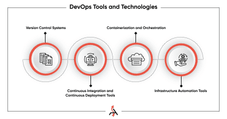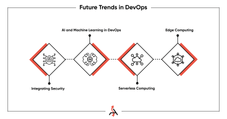In a rapidly evolving digital landscape, businesses are constantly challenged to deliver software and services efficiently. The demand for faster releases, higher quality, and increased reliability has led to the emergence of DevOps, a transformative approach that bridges the gap between development and operations. This blog explores the journey from chaos to coordination, illustrating how a DevOps development company can streamline operations to meet the demands of the modern era.
What is DevOps?
Defining DevOps
DevOps, as a concept, represents more than just a set of practices; it embodies a cultural and technical shift within the world of software development and IT operations. At its core, DevOps encourages collaboration, automation, and constant monitoring. It aims to improve the efficiency, quality, and speed of software development and delivery by breaking down the traditional barriers between development and IT operations.
The evolution of DevOps
DevOps didn’t appear out of thin air. It has its roots in methodologies like Agile and Lean and evolved as a response to the shortcomings of traditional software development practices. These conventional methods often resulted in siloed teams, slow delivery, and quality issues.
Core principles of DevOps
DevOps operates on several key principles, including collaboration, automation, continuous integration, and continuous delivery (CI/CD), infrastructure as code (IaC), and monitoring and feedback. Each of these principles plays a significant role in achieving the goals of DevOps.
Importance of streamlining operations
Challenges in traditional software development
Traditional software development processes often involve long development cycles, manual handoffs between teams, and siloed responsibilities. These practices lead to inefficiencies, delayed releases, and an increased risk of errors and outages. Streamlining operations is crucial to address these challenges and improve efficiency.
Inefficient operations can result in lost revenue, increased costs, and missed market opportunities. With various DevOps development services available, streamlining operations becomes easy as it is vital to reduce these costs and remain competitive.
The role of DevOps in streamlining operations
Bridging the gap between Dev and Ops
Collaboration and communication are the cornerstones of DevOps. When development and operations teams work together, it breaks down silos and enhances communication.
Continuous integration and continuous delivery (CI/CD)
CI/CD practices automate the software delivery process, from code integration to deployment. This eliminates manual handoffs, speeds up the release process, and minimizes errors.
Automation in DevOps
Automation is central to DevOps. It involves automating repetitive and manual tasks, such as code deployment, infrastructure provisioning, and testing. Automation accelerates the delivery process and reduces the risk of human error.
Key components of DevOps streamlining
Collaboration and communication
Effective collaboration and communication between development and operations teams are essential for streamlining operations. DevOps encourages cross-functional teams that work together throughout the software delivery process.
Infrastructure as code (IaC)
IaC treats infrastructure as software, making it easier to manage and provision. This approach ensures that infrastructure changes are consistent and predictable.
Monitoring and feedback
DevOps integrates real-time monitoring and feedback loops that enable teams to collect data on software performance and user behavior. This data provides insights into areas that require improvement and helps teams identify and address issues promptly.
Security integration
DevOps increasingly incorporate security as a core component, giving rise to the DevSecOps approach. Integrating security into the development process ensures that security vulnerabilities are addressed early in the software development life cycle.
Also read: Ultimate Guide to Outsourcing Software Development
DevOps tools and technologies
Version control systems
Version control systems like Git and SVN are essential for tracking and managing changes to code and configuration files. They enable collaboration, versioning, and code history.
Continuous integration and continuous deployment tools
Tools like Jenkins, Travis CI, and CircleCI automate the build and testing processes, ensuring that code changes are continuously integrated and deployed.
Containerization and orchestration
Containers, facilitated by technologies like Docker, allow applications and their dependencies to be packaged and run consistently across different environments. Orchestration tools like Kubernetes manage container deployment and scaling.
Infrastructure automation tools
Tools like Terraform and Ansible automate the provisioning and management of infrastructure, making it more agile and responsive to changing requirements.
Future trends in DevOps
The landscape of DevOps is in a constant state of evolution. As organizations strive to meet the demands of an ever-changing digital world with numerous DevOps development services, DevOps practices continue to adapt and expand. In this section, we’ll delve into some of the future trends in DevOps that are set to shape the way companies develop, deliver, and manage software in the years to come.
DevSecOps: Integrating security
One of the most significant trends in DevOps is the integration of security, often referred to as DevSecOps. In traditional software development, security has often been an afterthought, addressed late in the development process. DevSecOps, on the other hand, embeds security into every phase of software development, making it an integral part of the process. This approach ensures that security vulnerabilities are identified and addressed early, reducing the risk of data breaches and cyberattacks.
DevSecOps involves the automation of security testing, the use of security-focused coding practices, and the implementation of security policies as code. By automating security checks and including security experts in the development process, organizations can create more robust and secure software. This trend is particularly critical in an era where data breaches and cyber threats are on the rise, and regulatory requirements for data protection are becoming increasingly stringent.
AIOps: AI and Machine Learning in DevOps
Artificial intelligence (AI) and machine learning (ML) are making their way into DevOps processes. This trend, known as AIOps, leverages AI and ML to analyze vast amounts of operational data to detect anomalies, predict issues, and automate responses. AIOps tools can monitor system performance in real time, identify potential problems before they impact users, and even take automated actions to resolve issues.
For example, AIOps can detect a sudden increase in web traffic and automatically scale up the infrastructure to handle the load. This not only improves the reliability of services but also reduces the need for manual intervention. AIOps can also provide valuable insights by analyzing historical data, helping organizations make data-driven decisions about infrastructure and application performance.
Serverless computing
Serverless computing is another trend that is simplifying both development and operations. In a serverless architecture, cloud providers handle the underlying infrastructure, allowing developers to focus solely on writing code. This approach eliminates the need to provision and manage servers, making it easier to develop and deploy applications.
Serverless platforms, like AWS Lambda and Azure Functions, automatically allocate resources and scale based on the number of incoming requests or events. This elasticity results in cost savings as organizations only pay for the actual compute resources used. Serverless computing is particularly well-suited for microservices architectures and event-driven applications, enabling developers to build and deploy services with increased speed and agility.
Edge computing
Edge computing is gaining prominence in IoT (Internet of Things) and real-time applications. The idea behind edge computing is to process data closer to the source, reducing latency and enabling faster responses. This approach is crucial in applications where real-time decisions are necessary, such as autonomous vehicles or remote healthcare monitoring.
DevOps practices will need to adapt to manage edge environments. Edge infrastructure is often distributed and may include a variety of devices, from sensors to edge servers. DevOps teams will need to develop strategies for managing, monitoring, and deploying code to these distributed environments.
Conclusion
DevOps is a transformative approach that streamlines operations, improves efficiency, and accelerates software delivery. It breaks down silos, encourages collaboration, and emphasizes automation and monitoring to ensure faster and more reliable software development.
In today’s digital age, operational efficiency is crucial for businesses. Inefficient operations lead to increased costs, delayed releases, and dissatisfied customers. DevOps services, with its core principles and key components, address these challenges and foster a culture of continuous improvement. DevOps for cost efficiency enhances operational processes and significantly reduces expenses by streamlining workflows and optimizing resource usage.
As DevOps continues to evolve, companies must stay updated with the latest tools and trends. DevSecOps, AIOps, serverless computing, and edge computing are some of the emerging trends that will shape the future of DevOps.
So boost your business with DevOps development services, or just hire DevOps developers to transform and streamline your processes.
In conclusion, the journey from chaos to coordination is a path that a DevOps development company has successfully navigated. By embracing DevOps principles, streamlining operations, and adapting to future trends, businesses can stay competitive in a fast-paced, digital world.
Related Articles:



